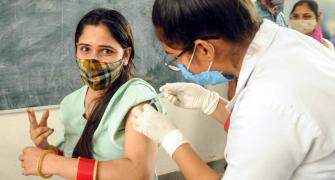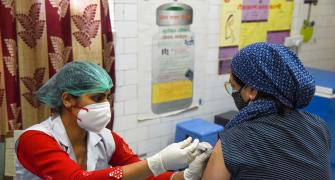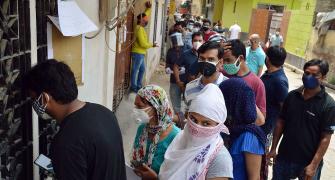This is a reservation of vaccines for the rich.
This perversity in vaccine distribution needs immediate correction.
It requires a complete withdrawal of the 'Liberalised Vaccine Policy', and a 100 per cent takeover of the vaccine procurement by the GoI, asserts R Ramakumar.

The decision of the Government of India (GoI) to partially correct its 'Liberalised Vaccine Policy' announced on April 19, 2021 is an admission of failure on multiple fronts.
The April 19 policy had divided up vaccine production in India into three pieces: 50 per cent for the GoI; 25 per cent for the state governments; and 25 per cent for private hospitals.
From its quota, the GoI would continue to provide vaccines free to everybody above the age of 45 years.
For everyone else, state governments and private hospitals were asked to directly purchase, though at a fixed price, vaccine doses from the two vaccine producers. These prices were two to six times higher than the prices at which vaccines were available for the GoI.
With the change in policy on June 7, 2021, the GoI has taken over the 25 per cent quota allotted to the state governments.
These vaccines would be given to everyone above the age of 18 years free of cost. The remaining 25 per cent quota for the private hospitals remains intact.
Across the world, vaccines are recognised as a 'global public good'. In other words, vaccines should be available universally, for everyone and everywhere, and be affordable, safe, effective and easily administered.
If vaccines are to be made available in this way as a global public good, the most efficient and equitable method is to freely make them available to all.
Free vaccination is globally accepted as a responsibility of enlightened welfare States. This is why several countries like the United States, the United Kingdom, Germany, France and China are vaccinating everyone free of cost.
With the 'Liberalised Vaccine Policy', India became a sorry exception to this global trend.
The 'Liberalised Vaccine Policy' also went against a central tenet in the Indian Constitution.
Right to Health is a Constitutional right of every citizen and the right to free vaccines flows as a sub-set of the Right to Life under Article 21. As such, free vaccination can be argued to be a Fundamental Right of every Indian citizen.
The 'Liberalised Vaccine Policy' was also unacceptable to economists across a spectrum of ideological inclinations. Even mainstream economic theory recognises vaccine markets as prone to market failures and suboptimalities.
The new policy fragmented India's unified vaccine market. It led to wasteful and irrational competitions between GoI and the states, between the states and private hospitals and between private hospitals.
The outcome was a drain of efficiency and transparency.
The 'Liberalised Vaccine Policy' was also inequitable in design.
Higher prices set for private hospitals would induce private producers to divert supplies to them rather than the state governments.
Richer hospitals would be able to procure more vaccines than less privileged private hospitals.
This was clearly visible too; 50 per cent (external link) of the vaccines sold to private hospitals in May 2021 were cornered by just nine private corporate hospitals. The remaining 50 per cent was sold to just about 300 private hospitals in the entire country.
The 'Liberalised Vaccine Policy' also gave rise to enormous public anger.
The policy was enacted with two goals. One, it was designed to deregulate vaccine prices and allow the large vaccine producers to make 'super profits'.
Two, it was designed to allow the GoI to shrug off all responsibility for future vaccine shortages and transfer the blame on to the State governments for their 'failure' to procure vaccines.
Both these objectives were seen through by the Indian public.
Giving political direction to this anger were chief ministers like Pinarayi Vijayan from Kerala. Beginning from a sharp letter to the prime minister on April 20, 2021, where he asked the GoI to take full responsibility to procure vaccines and distribute them free to all, and culminating in another letter on May 31 to 11 chief ministers of Opposition-ruled states asking them to join hands, Vijayan literally led the resistance from the front.
Finally, the Supreme Court of India (SCI) took up the matter suo moto. In every order, it criticised the GoI on the 'Liberalised Vaccine Policy'.
In the latest order, it admonished the policy as 'prima facie arbitrary and irrational"'
It was becoming clear that the SCI was nudging the GoI to shift gears. There was a clear threat that the SCI would ask the GoI to withdraw the 'Liberalised Vaccine Policy'.
The change in policy on 7 June 2021 should be seen in the context of all these developments in the political and judicial spheres.
The GoI was scrambling to contain people's anger. There was already considerable global ridicule on its handling of the second wave of the pandemic.
It could not afford more costs, particularly given the defeat of the ruling Bharatiya Janata party in the assembly elections in the states and the forthcoming elections in large states like Uttar Pradesh. Something had to be done.
The partial correction to the 'Liberalised Vaccine Policy' cannot be understood in the absence of this context.
At the same time, the GoI was also incapable of fully withdrawing the 'Liberalised Vaccine Policy'. As is clear, the GoI has displayed its inability to stand up to private vaccine companies and ask them to sell 100 per cent of their volumes at a regulated price.
Unlike many Western countries, the GoI did not make any at-risk investments in any private vaccine company to enlarge their production capacities. As such, it found itself batting on too bad a pitch to demand gratefulness from them in pricing.
Consequently, the partial course correction on June 7, 2021 allows private hospitals to retain their share of 25 per cent in the total vaccine production. This allows private producers to sell vaccines to private hospitals at exorbitant prices and make up for a part of the super profits lost.
In essence, however, this is a reservation of vaccines for the rich. It would only help to maintain inequity in the distribution of vaccines, though somewhat less than under the earlier policy.
This perversity in vaccine distribution also needs immediate correction. It requires a complete withdrawal of the 'Liberalised Vaccine Policy', and a 100 per cent takeover of the vaccine procurement by the GoI.
One hopes that the SCI would further nudge the GoI towards this end when it takes up the case later this month. Alongside, free and universal vaccination should become a non-negotiable political slogan in India.
R Ramakumar is Professor at the Tata Institute of Social Sciences, Mumbai.
Feature Presentation: Ashish Narsale/Rediff.com









